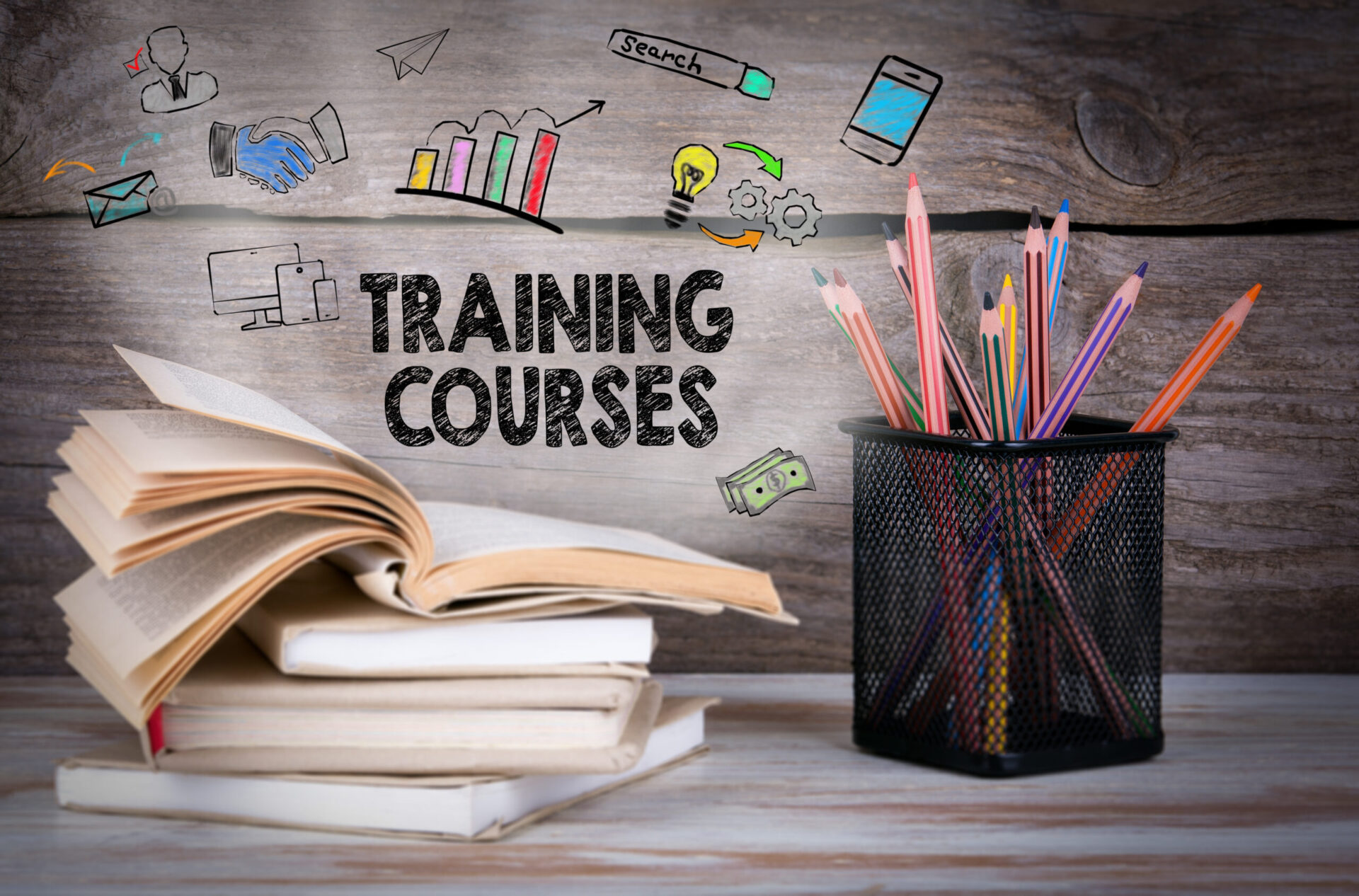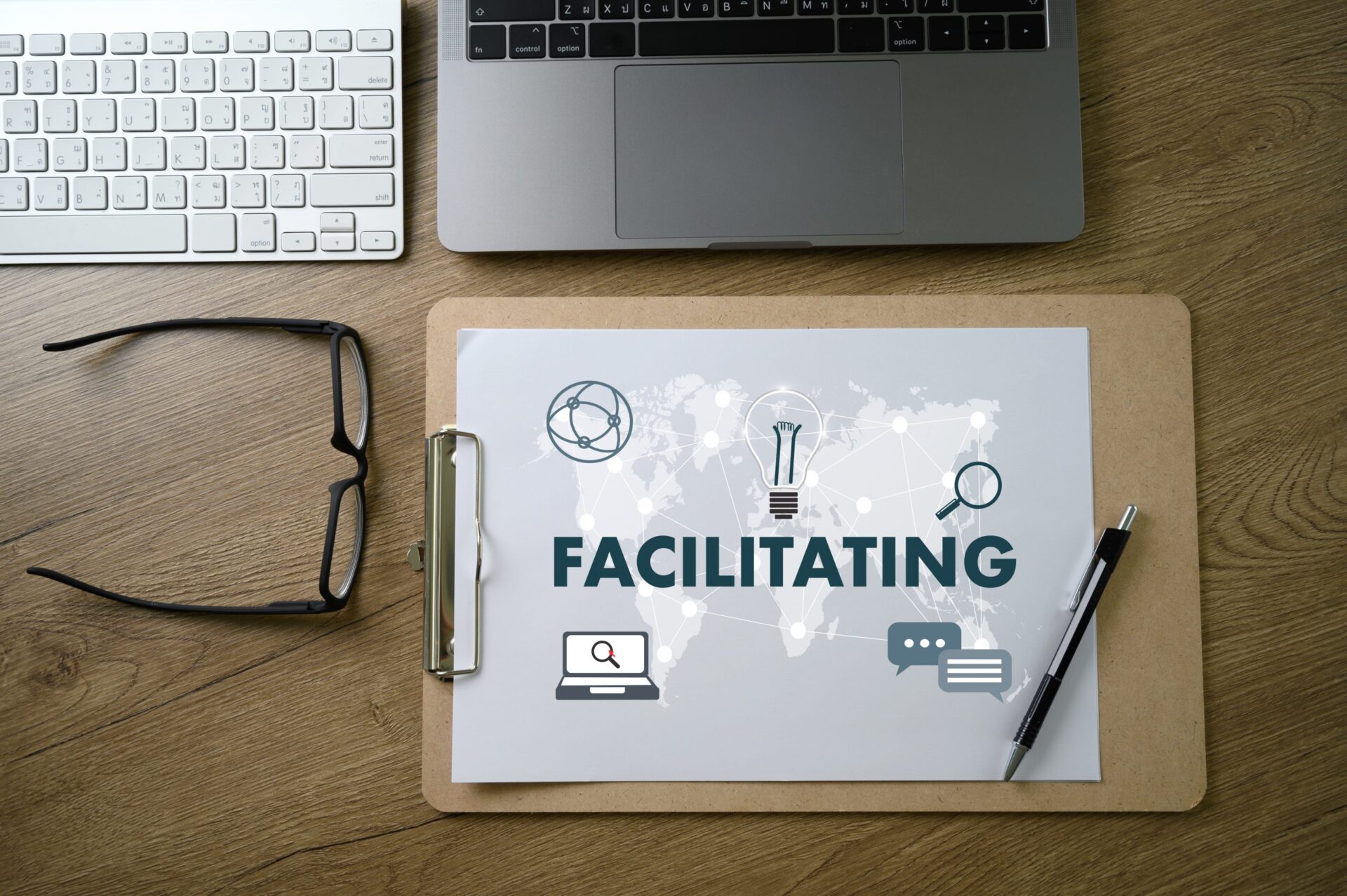“When I grow up I want to become a professional facilitator,” said no-one, ever.
But once you get into the complicated world of the workplace, and begin to understand that the skills in helping organisations make decisions in complicated situations are crucially important, then it begins to look like a more attractive role.
So – how do you become a professional facilitator? What is facilitator skills training and what do facilitator skills training courses look like?
What do professional facilitators actually do?

Time to drop in a bit of Latin: facilitator is from the word meaning ‘to make easy’. So in tricky situations, it’s the facilitator’s job to smooth the way, work out what’s happening under the surface of the group, ease tensions and move the group towards consensus, decisions, or whatever the goal of the day. With a facilitator, everything moves more efficiently, new ideas are found, synergies are created and outcomes are reached.
It’s not the facilitator’s job to be expert on atever is being discussed or taught – their skills are around people and group dynamics rather than things.
Facilitators are used in planning sessions, meetings and training, and facilitation skills are essential for professionals working with groups in the workplace or other high-level organisations. Task forces, committees, project teams, boards of trustees and more – all these benefit from having facilitation skills in the mix.
And it’s a skill which is becoming more essential as traditional organisations find themselves challenged by disruptors or finance, or as part of Organisational Development transformations.
Organisations are increasingly recognising the benefit of building their own OD expertise, and one key skill to have in-house is facilitation.
So it’s worth considering taking facilitation training courses to make you a more skilled leader or manager in your workplace and your career, adding these skills to your wider toolbox.
What are the skills that professional facilitators have? What do I need to do to become a professional facilitator?

We don’t teach off-the shelf facilitation skills at Roffey Park: our courses are about practical experience of making facilitation work.
But of course there are skills which good facilitators have: excellent people skills, for a start. They need to get everyone involved in meetings, understand what’s going on under the surface and accept and empathise.
Facilitators need to be active listeners and forensic questioners, with open-ended enquiries which stimulate discussion. They will be doing group problem-solving, defining the task, outlining solutions and so on. And they need to lead.
That’s just a few of the skills a professional facilitator will have.
So how does a facilitation skills training course help you acquire these skills?

Techniques we use in our programmes at Roffey Park start with setting the boundaries. What does the group want to achieve? How will disagreements be handled? What will the facilitator do?
The other important element of boundary setting is to create an environment of trust, confidentiality and openness.
The facilitator will be reminding the group about the ground rules as the meeting goes on.
The next thing we emphasise is the importance of remaining impartial. Think about this for a moment, and you’ll realise this is often not as easy as it sounds. You can influence but not dominate the group, which means allowing and encouraging others to talk, and help them reach a consensus.
We help you to think about the group dynamics, and that means seeing below the surface. What do the individuals think about the meeting? Are they bored, frustrated, angry? What are the political groupings and dynamics? Who’s working with who?
Senses and intuition are important in organisations, and you’ll want to use them to pick up on the atmosphere. What’s the body language? Who’s quiet? Who’s dominating? You’ll learn how to use questions to probe what’s really happening and add to what you can see.
The next thing is that in some ways it is all about you. As a facilitator, your role is as much about what you are as what you say and do. It’s your energy and personality which will move the group along, create an open and honest environment and make people feel safe that you can deal with anything that happens. So how you appear is important.
Are you ready to intervene? You’re the one who’s monitoring what’s being said and unsaid, and the shape of the discussion – you need to nudge things along now and again, which could mean as little as an encouraging smile or as much as asking difficult questions which might make everyone feel uncomfortable.
Which brings us to handling difficult situations which are one of the biggest challenges you’ll find as a facilitator. You won’t be surprised to learn that the underlying problems can be the biggest. Sometimes it can be time for a coffee break, a brainstorm or a different set-up.
And finally – facilitators are made not born, and you won’t walk out of a facilitation training course as an expert (although you’ll be pretty good at it!). What you need now is practice, and plenty of it. That’ll help you become comfortable with the constant decision making and the skills of observation, listening, reading body language, understanding human behaviour and moving beyond the content.
What kind of facilitator skills training course should you look for?
At Roffey Park we offer a number of facilitation skills courses.
As you’d expect, they are underpinned by our philosophy. Ours are not facilitator training courses that show you how to facilitate skills transfer or knowledge download. We don’t give you an ABC of tools to go away and use. What our courses do is allow you to practise and develop your skills and confidence to be an enabler of groups working across a wide range of scenarios.
Our courses are practical and experiential – you’ll prepare and facilitate a group activity and receive in-depth feedback. You’ll be prepared for working with a range of groups in a range of situations, rather than learning a series of exercises which will leave you stranded if they don’t work with a particular group.
We also believe you learn from each other in the group, and with the help of our highly-experienced facilitators.
What facilitation training course is right for me?
Practical Facilitation Skills is a two-day course run at our London Gatwick base. This is for line managers who want their teams to be more effective, or HR, OD or L&D professionals who want to become better at working with groups to drive change, get results and improve delivery.
Advanced Facilitation Skills is a three-day course run at our London Gatwick base in the UK, offering a stimulating and challenging environment to take participants’ existing facilitation practice to deeper levels. This course is for experienced facilitators.
We can also customise facilitation training courses to meet the needs of your organisation.
No matter where you’re based, our expertise is easy to reach as we’re close to the UK’s London Gatwick, the M25 and fast train services. Why not find out more about what we do and how we do it and contact our team to discuss your needs.





